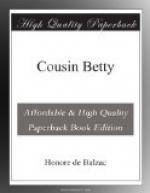“I know,” said Lisbeth, “and that is what brings me here. Victorin met him at about five in the afternoon going into an eating-house at five-and-twenty sous, and he brought him home, hungry, by working on his feelings, to the Rue Louis-le-Grand.—Hortense, seeing Wenceslas lean and ill and badly dressed, held out her hand. This is how you throw me over—”
“Monsieur Henri, madame,” the man-servant announced in a low voice to Valerie.
“Leave me now, Lisbeth; I will explain it all to-morrow.” But, as will be seen, Valerie was ere long not in a state to explain anything to anybody.
Towards the end of May, Baron Hulot’s pension was released by Victorin’s regular payment to Baron Nucingen. As everybody knows, pensions are paid half-yearly, and only on the presentation of a certificate that the recipient is alive: and as Hulot’s residence was unknown, the arrears unpaid on Vauvinet’s demand remained to his credit in the Treasury. Vauvinet now signed his renunciation of any further claims, and it was still indispensable to find the pensioner before the arrears could be drawn.
Thanks to Bianchon’s care, the Baroness had recovered her health; and to this Josepha’s good heart had contributed by a letter, of which the orthography betrayed the collaboration of the Duc d’Herouville. This was what the singer wrote to the Baroness, after twenty days of anxious search:—
“MADAME LA BARONNE,—Monsieur Hulot was living, two months since, in the Rue des Bernardins, with Elodie Chardin, a lace-mender, for whom he had left Mademoiselle Bijou; but he went away without a word, leaving everything behind him, and no one knows where he went. I am not without hope, however, and I have put a man on this track who believes he has already seen him in the Boulevard Bourdon.
“The poor Jewess means to keep the promise she made to the Christian. Will the angel pray for the devil? That must sometimes happen in heaven.—I remain, with the deepest respect, always your humble servant,
“JOSEPHA MIRAH.”
The lawyer, Maitre Hulot d’Ervy, hearing no more of the dreadful Madame Nourrisson, seeing his father-in-law married, having brought back his brother-in-law to the family fold, suffering from no importunity on the part of his new stepmother, and seeing his mother’s health improve daily, gave himself up to his political and judicial duties, swept along by the tide of Paris life, in which the hours count for days.
One night, towards the end of the session, having occasion to write up a report to the Chamber of Deputies, he was obliged to sit at work till late at night. He had gone into his study at nine o’clock, and, while waiting till the man-servant should bring in the candles with green shades, his thoughts turned to his father. He was blaming himself for leaving the inquiry so much to the singer, and had resolved to see Monsieur Chapuzot himself on the morrow, when he saw in the twilight, outside the window, a handsome old head, bald and yellow, with a fringe of white hair.




